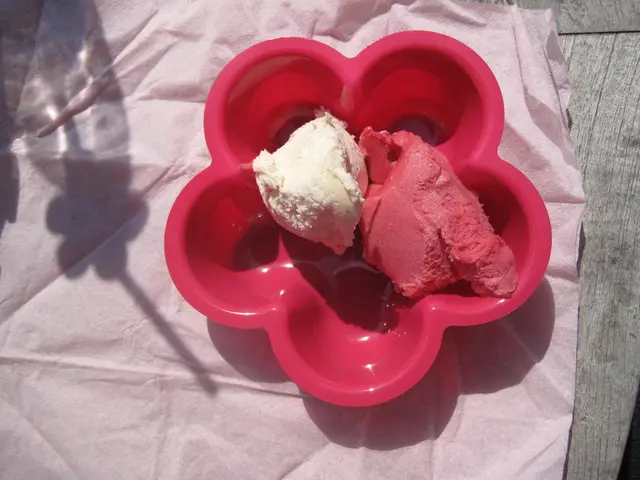Rosacea's severe form, characterized by rapid onset: Causes, signs, and remedies explained
Rewritten Article:
Rosacea fulminans, a rarer and more extreme form of rosacea, rears its ugly head as an aggressive, inflammatory skin condition. This sudden, central facial affliction usually targets the chin, cheeks, and nose, resulting in a flushed, swollen complexion with painful, interconnected nodules and pimples.
often referred to as pyoderma faciale, rosacea fulminans presents a stark contrast to common rosacea or acne, characterized by more severe and quickly emerging symptoms.
Primarily affecting females in their childbearing years, the exact underlying cause of this condition remains elusive. However, a 2020 review suggests a potential connection between rosacea fulminans and other conditions such as inflammatory bowel disease and pregnancy. Additionally, people with a pre-existing history of rosacea may be at a higher risk [1].
Rosacea fulminans may be set off by several triggers, such as:
- stressful situations
- hormonal fluctuations
- specific medications
A 2021 literature review sheds light on how certain dietary factors might cause or worsen rosacea symptoms; yet, it's essential to emphasize that this information may not apply specifically to rosacea fulminans [1]. Potential dietary triggers include spicy foods, alcohol, foods high in cinnamaldehyde (like chocolate, tomatoes, and citrus fruits), historically rich foods (like wine, aged cheese, and processed meats), and hot beverages. Interestingly, individual responses to dietary triggers can vary significantly [2].
Rosacea fulminans primarily affects the forehead, nose, cheeks, and chin. Symptoms include:
- sudden, localized skin color changes, such as redness
- painful pustules, papules, and nodules that may merge
- swelling and inflammation
- flushing and blushing
- stinging and burning
Some people may also experience eye-related symptoms like dryness, itching, and light sensitivity, while others may experience systemic symptoms such as fever and fatigue [3].
Treatment for rosacea fulminans may incorporate oral isotretinoin, a prescription-only acne medication, along with corticosteroids, either orally or topically [4]. A 2016 case study observed improvements in a person's symptoms through the combination of antibiotics, corticosteroids, and lifestyle changes [4].
Given the potential triggers of rosacea, healthcare professionals might recommend stress reduction techniques like mindfulness meditation, deep breathing exercises, regular exercise, and journaling [5]. Additionally, they may suggest dietary modifications such as reducing alcohol intake. Using gentle skin care products on the face may also prove beneficial [5].
If a person experiences symptoms beyond typical rosacea or acne, sudden onset of symptoms, persistent or worsening symptoms despite treatments, eye irritation or inflammation, systemic symptoms like fever, or noticeable discomfort, they should reach out to a dermatologist or another healthcare professional for proper diagnosis and treatment [6].
Swift action can help manage symptoms, prevent complications such as scarring and infections, and alleviate emotional distress, potentially enhancing the person's overall quality of life [6]. By consulting with a healthcare professional, the individual will receive tailored care and comprehensive management strategies specific to their unique needs and circumstances [6].
TL;DR
Rosacea fulminans is a rare, severe skin condition typically affecting females that suddenly appears on the central part of the face. Symptoms may include flushed, swollen, and painful nodules, as well as eye-related issues. Although the exact cause is unknown, healthcare professionals might recommend stress management, dietary changes, and corticosteroid or isotretinoin treatment. Seeking prompt diagnosis and care can help manage symptoms, reduce complications, and improve overall quality of life [6].
Enrichment Data:
Overall:
- Dietary triggers for rosacea fulminans include spicy foods, alcohol, foods high in cinnamaldehyde (like chocolate, tomatoes, and citrus fruits), historically rich foods (like wine, aged cheese, and processed meats), and hot beverages [1]. It's important to note that responses to dietary triggers can vary significantly from person to person [2].
- Stress reduction techniques such as mindfulness meditation, deep breathing exercises, regular exercise, and journaling, as well as dietary modifications like reducing alcohol, might be recommended by healthcare professionals [5].
- Rosacea fulminans, a severe and uncommon form of rosacea, is characterized by sudden, central facial inflammation affecting the chin, cheeks, and nose, causing a flushed, swollen complexion with painful, interconnected nodules and pimples.
- People with pre-existing rosacea history may have a higher risk of developing rosacea fulminans, which primarily affects females in their childbearing years, although the exact underlying cause remains elusive.
- Triggers for rosacea fulminans can include stressful situations, hormonal fluctuations, and specific medications, along with potential dietary factors like spicy foods, alcohol, cinnamaldehyde-rich foods, historically rich foods, and hot beverages.
- Treatment for rosacea fulminans may involve oral isotretinoin, corticosteroids, and a combination of antibiotics, focusing on managing symptoms, preventing complications, and improving overall quality of life.
- Healthcare professionals might recommend stress management techniques, dietary modifications, and gentle skin care products to help manage rosacea symptoms and potentially reduce triggers.
- Prompt diagnosis and treatment by a dermatologist or healthcare professional are essential for managing rosacea fulminans symptoms, preventing complications, and alleviating emotional distress.







